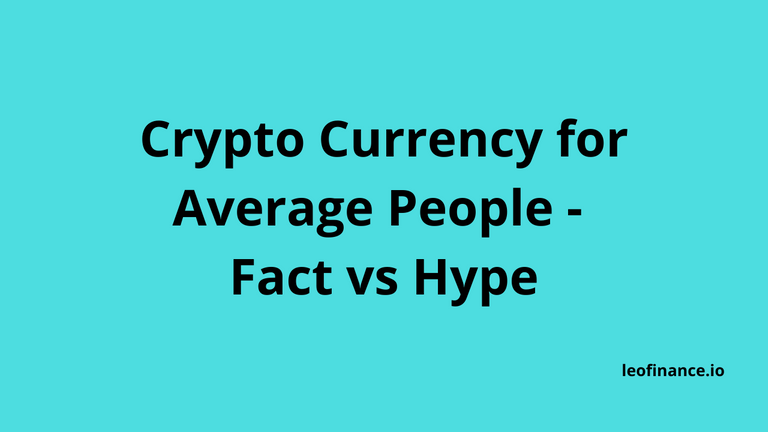Crypto Currency for Average People - Fact vs Hype
Have you ever attended the upcoming blockchains' sales pitch deck or slides? Many of them promise to offer the coin that could be used to replace the banks or the govt money. The reality, however tells us the other story.

Let us take a look at some of the hype vs facts in the context of blockchain is reaching itself to ordinary people.
Entry
Many blockchains tell you that people from 3rd world do not even have the means to open a bank account and crypto is the answer to that. But in reality, they won't tell you that internet access is harder in 3rd world country that puts bigger limitation.
When you have ample amount of data and the cheaper access, people eventually learn how to use apps, create wallets etc. Often the barrier to entry is not govt & financial situation to use crypto, but the internet access that is often limited in some places.
Learning Curve
Have you noticed the learning curve associated with sending payments? In case of PayPal, bank apps and the 3rd party payments app like Venmo, stripe etc have very minimal learning curve. Just connect your bank account once and pay.
On the other hand, crypto requires a lot of learning, like creating a wallet address and securely storing the private keys. Taking care of the wallet keys and making sure it won't fall into the hands of the wrong people. Hive is setup and easier, yet many other cryptos are not easy even with multicurrency wallets.
As you can see, contrary to what people think, crypto and blockchain involves a lot of initial barriers in order to accept, send and make routine out of money sending. Plus, the wallets are public, which many average people don't like even if they are anonymous.
Transaction Fees
When you send FIAT money from one person to another, you won't have any transaction fees unless you use the electronic means of payment. You would have taxes but on specific transactions. But in crypto there is a transaction fee for everything.
Take case of Ethereum, the current minimal fee is 3 USD per transaction. Isn't that a big barrier to entry? Do you think the people who have jobs under 1000 USD would afford 3 USD per transaction fees for their everyday usage?
Reversal
This is one benefit and also one of the biggest issues with the blockchain. You just can't reverse the funds. In case of fiat, banks can help you reverse the funds and secure you in case of fraud or credit card theft etc. That's simply is not going to happen, and the people are being forced to double-check before making the transaction.
As much as good this sounds lack of reversal puts many average people on hold from adopting crypto as a means for transactions.
Anonymity & Frauds
Money is a universal connector for both frauds and anonymity. Imagine when you pay some MLM owner who gets you into this program and later shuts it down and there is no way to recover. In case of FIAT, you can have traces that can lead upto him and chances to put him or her into jail.
How can you do that with crypto based scams and frauds? You need to be more savvy on many things in order to avoid frauds and scams that happen to you and around you. Not everyone can be that much superior in their life towards such depth of tech.
Checklist on Crypto Adoption by Average People
Some things take time for the generations to accept and adapt and often we don't talk about them because we want certain things to be accepted quicker for our own benefit. But let's see if crypto can help with it's own adoption in the market by average people if it successfully address their concerns.
- If shop keepers prefer selling you chocolate over 20 cents worth of change, why would they want crypto that can eat their benefit?
- If every transaction is charged over the network on the top of the state, country-based VAT taxes, why would average shops and businesses accept crypto?
- If crypto has too much learning curve for technically challenged people, how does it open itself up for simplicity?
- Does crypto opens up the option for reversal in case of frauds?
- If banks & govt is not in control, who guards the average helpless people in case of frauds and financial attacks?
Cryptocurrency has opened up a lot of interesting discussions so far, but it has yet to address the certain sector in the society which is technically slow or challenged.
Unless the blockchains and the cryptocurrency address those concerns, the poor and lower middle class stays where they are, and crypto remains the game of technically savvy people and rich people.
Posted Using LeoFinance Beta
Nice one
Crypto mass adoption is happening slowly and next few years we will see a breakthrough
Posted Using LeoFinance Beta
I think biggest hurdle is government desire to curb it in many places.
Posted Using LeoFinance Beta